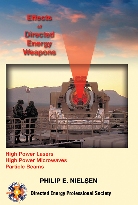
| |
DIRECTED ENERGY
PROFESSIONAL SOCIETY
|
|
|
| This book, as well as other books on Directed Energy,
are available from the DEPS online store. |
Preface
This book is on the effects of directed energy weapons:
how they propagate to and interact with targets. Propagation and
target interaction are the key elements in an analysis of a
weapon’s utility to accomplish a given mission. For example, the
effectiveness of a nuclear missile is determined by the yield of its
warhead and the accuracy of its guidance, and the effectiveness of
a rifle is determined by the type of round fired, the range to the
target, and the skill of the soldier who fires it. Directed energy
weapons are no different. But while there are books and manuals
that deal with the issues affecting the utility of nuclear missiles
and rifles, there is no comparable source of information for directed
energy weapons. I have tried to fill that void with this book.
Weapons are devices which deliver sufficient energy to targets to
damage them. Weapon design involves a dialog between weapon
designers, and military planners. Designers create means of projecting
energy, and planners have targets that they would like to
destroy. Effective design requires knowledge of the targets and
the circumstances of their engagement, and effective planning requires
a knowledge of the weapons and their characteristics. But in
new and emerging areas of weaponry, designers and planners
often do not speak the same language. As a result, designers can operate
in ignorance of operational realities, and planners can assume
that anything involving new technology will meet all their needs.
This book should also serve as an introduction to the language of
directed energy weapons for military planners and other non-technical
persons who need to understand what the engineers and scientists
involved in their development are talking about.
Chapter 1 outlines basic philosophies and ideas that are used
throughout the book. The other chapters are each devoted to a specific
type of directed energy weapon, and are reasonably self-contained.
Therefore, a reader interested primarily in one weapon type
will find it sufficient to read Chapter 1 together with the chapter of
interest. In some cases, duplication is avoided by developing topics
in great detail in one chapter, and presenting them again in a summary
form in other chapters. The reader is referred to the detailed
discussion for any elaboration that may be required.
I have assumed no technical background other than that associated
with an introductory college-level physics course. Some
knowledge of algebra and trigonometry is assumed. Knowledge
of calculus would be helpful but is not required. Equations are
provided so that those with sufficient interest and motivation can
extend the results in the text. Numerous graphs and examples will
enable casual readers to skim over any material which seems too
mathematical.
Weaponry is not a precise science. Propagation paths and target
details are never known precisely. You would not want to go hunting
for bear with a rifle whose bullet was precisely designed to just
penetrate the skin of an average bear, only to come up against a
bear that had just put on weight for the winter! You would probably
prefer a rifle designed to work against the biggest conceivable
bears. The same is true of directed energy weapons. Too much precision
in effects calculations is unwarranted, and a certain amount
of conservatism is required in defining operational parameters.
Therefore, I have kept arguments physical and intuitive at the expense
of mathematical rigor. All formulas and expressions should
be considered correct to "zero order" - good enough to produce
answers within an order of magnitude of the "correct" result. No
attempt has been made to incorporate the latest and most accurate
experimental data, as these are under continual revision. Rather,
the material presented here is designed to enable you to place theories
and results in the proper context. Extensive notes and references
are provided for those who would care to go into any topic in
greater depth.
|

